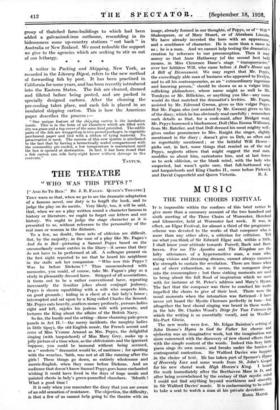MUSIC
THE THREE CHOIRS FESTIVAL
IT is impossible within the confines of this brief notice to give more than a summary account of the two hundred and sixth meeting of the Three Choirs of Worcester, Hereford and Gloucester, held at Worcester last week. It was, in effect, an Elgar Festival, for almost a third of the programme scheme was devoted to the works of that composer who is more than any other aliVe, a criterion for criticism. Tell me what you think of Sir Edward Elgar arid, within a little, I shall know your attitude towards Purcell,-Bach and Beet- hoven. For me The Apostles and The Kingdom are the lofty utterances of a hypersensitive man, a man who, seeing visions and dreaming dreams, cannot always summon the strength to sustain the revelation. There are times when out of sheer exhaustion, as it seems, the composer drops into the commonplace ; but these sinking moments arc used to bring about the full flood of inspiration which we meet
with for instance at St. Peter's • addreSS and Mary's Hymn. •
The fact that the composer was there to conduct his works impelled the choirs to give of their best. There were the •
usual moments when the intonation was flattenedI have
never yet heard the Mystic .ChOruses perfectly in tune—but altogether .the best choral singing was heard in these works, in the late Dr. Charles Wood's Dirge for Two Veterans (in which the writing is so essentially vocal), and in Weelkes' Six-Part Gloria.
_ . The new, works were few. Mr. Edgar Bainton's setting of JOhn Donne's Hymn to .God 'the Father for chorus and orchestra was an imaginative work, but the imagination was more concerned with the discovery of dew choral effects than with the simple content of the words. Indeed this fiery little poem sings its own music, and breaks under the burden of contrapuntal. contention. Sir Walford Davies was happier in. the choice ,of text.. He has taken part of Spenser's 'Ira of Heavenly Lore and some words from St. John's Gospel for his new choral work High HeaVen's King. I heard the ,work immediately after the Beethoven Mass in D, and after being Overwhelmed by the ecstasy of that niYitic mind I could not find anything beyond worthineas •and sincerity in Sir Walford Davies' music. It is embarrassing to be asked to take a seat to watch a man at his priVate devotions. Bean. litimE






























































 Previous page
Previous page